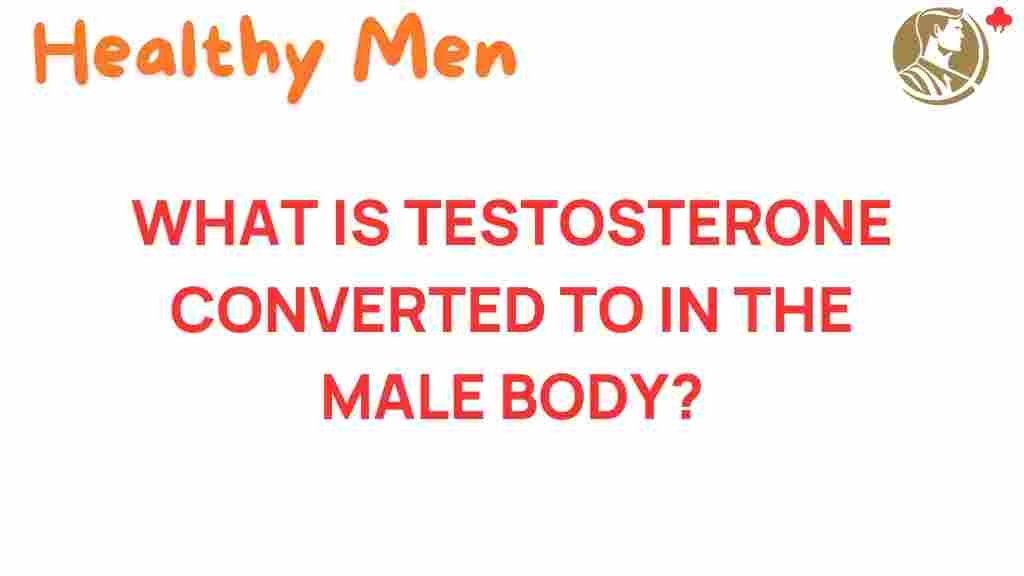Unveiling the Mystery: What Does Testosterone Transform Into in Men?
Testosterone is often considered the cornerstone of male health, playing a vital role in various biological processes. Understanding what testosterone transforms into in men can provide deeper insights into male hormones, their conversion processes, and overall health. In this article, we will explore the fascinating world of testosterone, its effects, and its significance in the balance of male hormones.
Understanding Testosterone and Its Role in Men’s Health
Testosterone is an androgen, a type of male hormone produced primarily in the testes, with smaller amounts made in the adrenal glands. It is crucial for:
- Development of male reproductive tissues
- Promotion of secondary sexual characteristics
- Maintenance of muscle mass and bone density
- Regulating mood and energy levels
The balance of testosterone is essential for optimal health. Low testosterone levels can lead to various health issues, including fatigue, depression, and decreased libido, while excessively high levels can also have adverse effects.
The Conversion Processes of Testosterone
Testosterone does not exist in isolation; it undergoes several conversion processes in the body. Understanding these conversions is critical for comprehending how testosterone affects male health.
1. Conversion to Dihydrotestosterone (DHT)
One of the primary transformations of testosterone is its conversion to dihydrotestosterone (DHT) through the action of the enzyme 5-alpha reductase. DHT is more potent than testosterone and is responsible for:
- Development of male characteristics during puberty
- Maintenance of libido
- Influencing hair growth patterns
However, elevated levels of DHT can lead to conditions such as male pattern baldness and benign prostatic hyperplasia (BPH).
2. Conversion to Estradiol
Testosterone can also be converted into estradiol, a form of estrogen, via the aromatase enzyme. This conversion is significant because:
- Estrogens are crucial for bone health and metabolic processes.
- They play a role in regulating mood and emotional well-being.
However, too much estradiol can result in hormonal imbalances, which can lead to gynecomastia (enlarged breast tissue in men) and other health issues.
Factors Influencing Testosterone Conversion
Several factors can influence how testosterone is converted in the body, including:
- Age: As men age, testosterone levels typically decline, affecting conversion rates.
- Body Composition: Higher body fat percentages can increase aromatase activity, leading to more testosterone being converted to estradiol.
- Diet: Nutritional choices can impact hormone levels and conversion processes.
- Stress: Chronic stress can lead to hormonal imbalances, affecting testosterone levels and conversions.
The Effects of Testosterone on Health and Biology
The effects of testosterone on male health are profound and multifaceted. Here’s how testosterone influences various aspects of health:
- Physical Health: Testosterone is essential for muscle growth, fat distribution, and bone density. Low testosterone can lead to obesity and osteoporosis.
- Mental Health: Testosterone influences mood, energy levels, and cognitive function. Low levels can contribute to depression and fatigue.
- Sexual Health: Testosterone is crucial for libido and sexual performance. Low levels can result in erectile dysfunction and reduced sexual desire.
Maintaining Hormone Balance
Maintaining a healthy balance of testosterone and its derivatives is crucial for overall health. Here are some tips to help maintain hormone balance:
- Regular Exercise: Engaging in strength training and cardiovascular activities can boost testosterone levels.
- Healthy Diet: Eating a diet rich in healthy fats, lean proteins, and whole grains can support hormone balance.
- Manage Stress: Stress management techniques such as meditation, yoga, and deep-breathing exercises can help maintain healthy hormone levels.
- Regular Check-ups: Regular health check-ups can help monitor testosterone levels and overall health.
Troubleshooting Low Testosterone Levels
If you suspect low testosterone levels, consider the following steps:
- Consult a Healthcare Professional: A doctor can perform blood tests to assess testosterone levels and recommend appropriate treatments.
- Evaluate Lifestyle Factors: Assess your diet, exercise routine, and stress levels to identify potential areas for improvement.
- Consider Medical Treatments: Depending on the underlying cause, treatments may include testosterone replacement therapy or medications to manage hormone levels.
For more information on managing testosterone levels, you can visit Men’s Health Network.
Conclusion
Understanding what testosterone transforms into in men is essential for grasping the broader picture of male health. The conversion processes of testosterone into DHT and estradiol play significant roles in various bodily functions and health outcomes. By maintaining a healthy balance of testosterone and addressing any hormonal imbalances, men can improve their overall health, well-being, and quality of life.
For further reading on the intricate workings of male hormones and their effects, consider exploring resources on endocrinology and hormone balance.
This article is in the category Conditions and created by healthymen Team
